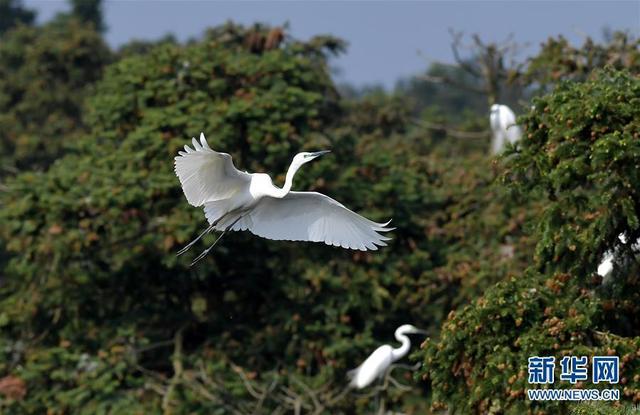Improved wildlife numbers disrupt farming


Days before feeding fish fry in the paddy fields, rice farmer Lei Binghua installed a loudspeaker in his farm in Southeast China's Fujian province.
With the sounds of wolf howls and dog barks blaring, the loudspeaker is part of Lei's arsenal to fight egrets.
"Egrets are protected animals. You can't shoot them. You just try to scare them away," said Lei, who has yet to come up with a better solution.
This is the second year that Lei has tried to farm fish in the rice paddies of Jianyang district in Nanping city.
In a video clip recorded last April, Lei was seen yelling at a flock of egrets in the fields. Though the flock was startled by the shouts and flew away, it only flew to another rice plot nearby.
"There are hundreds of them. Just can't get rid of them," Lei said, describing the battle against the birds as "annoyingly amusing".
The carp fingerlings that Lei has in the rice fields are what make the egrets linger. Last spring, he put nearly 10,000 baby fish in the fields, but only a small number made it to harvest season after months of looting by hungry egrets. The total catch was just over 100 kilograms.
However, the egrets were the least of his worries years ago. Rice prices slumped from 3.1 to 2.4 yuan (46-36 cents) per kg, cutting Lei's annual income by almost 300,000 yuan.
"No longer can we make profits simply by increasing output given the sharp price decrease," said Lei, who runs a rice farm of more than 66.7 hectares. "I have to think outside the box."
In 2017, Lei diversified his inventory by introducing ducks into 6.67 ha of rice fields, and continued his experiment with fish farming in another 3.3 ha of rice fields the following year.
His efforts paid off. In addition to the fish and ducks, he reaped high-quality organic rice as there were no chemical fertilizers or pesticides used, so as not to poison the animals raised in the fields. The organic rice, a much sought-after product among China's high-income earners, can be sold for 10 to 20 yuan per kg.
To kill insects, Lei relies on solar insect killer lamps and has planted vetiver grass as a repellent.
However, the growing number of uninvited guests such as wild boars and monkeys has become a nuisance. "Five mu (3,300 square meters) of rice fields were ravaged by boars, and monkeys stole bamboo shoots grown on 3 mu of my land," the farmer complained.
Lei is one of the many farmers troubled by increasing wildlife numbers in the area. They frequent farmlands and villages as their habitats keep improving.
Xiao Yingzhong, an official with the Jianyang Forestry Bureau, said forest vegetation recovered after years of conservation, which has boosted biodiversity and increased the number of wild animals, as ecological farming lures them further into the fields.
Located at the foot of the Wuyi Mountains, Jianyang boasts abundant forest resources and is an important area for wildlife conservation.
Xiao said 80 percent of wild animals in Jianyang are well protected now, thanks to persistent efforts to improve conservation infrastructure and crackdowns on pollution discharge, poaching and illegal logging.
The egrets will launch their invasion again, and boars and monkeys are coveting the crops too. Lei has a slim chance of winning the war, but he was quick to see the silver lining.
"By selling organic rice, I can earn at least 6,000 yuan per mu (667 sq m), much more than the old days even if the egrets gobble up all the fish," Lei said.
Hu Defu, a professor at Beijing Forestry University, said wildlife habitats have been damaged by human activity for a long time. However, as the environment improves, some wild animals see immediate restoration of their population and it is their turn to invade the working and living spaces of people.
"In some places, the government has been subsidizing farmers for losses caused by wildlife," Hu said. "Local governments should come up with a proper subsidy mechanism for farmers having such problems."
Xinhua
- Macao thrives as collaboration deepens
- Beijing reiterates strong opposition to US arms sales to Taiwan
- Attack in Taipei injures 9, including 4 in critical condition: local media
- Ministry to launch month-long program aimed at promoting youth employment
- National health body asks consumers to read nutritional information on food labels
- China's top cyberspace regulator launches drive against capital market misinformation




































